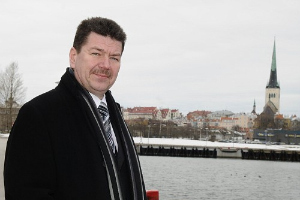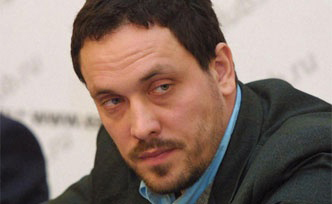
Human Rights Activist Andrei Zarenkov Arrested in Estonia
/ Главная / Russkiy Mir Foundation / Publications / Human Rights Activist Andrei Zarenkov Arrested in EstoniaHuman Rights Activist Andrei Zarenkov Arrested in Estonia

On Saturday, January 4, the Central Criminal Police of Estonia arrested the head of the Estonian human rights organization Estonia Without Nazism, Andrei Zarenkov, on charges of accepting a bribe, Interfax reports. Law enforcement officials have made no statements regarding the circumstances, although media report that he received a bribe of 1000 euro from another person, who was also detained by the police.
The arrest of the former head of the Constitution Party of Estonia, which seeks to represent the non-native residents of the country, provoked a major public outcry. The international World Without Nazism movement issued a statement in defensive of Andrei Zarenkov. “The international World Without Nazism movement has all reasons to suspect that this involved an outright provocation by Estonia special services with the aim of discrediting a well-known human rights activist and at the same time the entire anti-Fascism movement,” the organization said in its statement.
Representatives of European think tanks have written a letter to President of Estonia Toomas Hendrik Ilves in which on behalf of the expert community and civil society of Poland unequivocally condemned the arrest of the prominent Estonia human rights activist. “Today Estonian law enforcement officials are demonstrating a far from European level of the use of the justice system as a political tool to deal with disagreeable citizens. We believe that this incident with the arrest of Andrei Zarenkov is not only a national disgrace for Estonia but also a blot on the justice system of the entire European Union,” Regnum quotes the experts.
Russian public figures have been no less harsh in their assessment of the situation. For example, journalist Maxim Shevchenko believes that “we need to demand that Russian authorities take decisive measures to protect the anti-Fascists in Estonia up to and including an embargo.”

The Civic Chamber Tribune [an internet publication of the Civic Chamber of the Russian Federation] ask Maxim Shevchenko to comment on what he thinks would be a symmetrical response to the actions of Estonian law enforcement:
— This arrest is of a political nature despite the corruption charges. It’s unclear what kind of corruption charges there could be if Andrei is not a government official. At the same time the arrest strangely coincided with two things: the holding of an anti-Fascist conference and celebrations of Orthodox Christmas. I don’t think that such politics on the part of the Estonian authorities will lead to anything good.
I believe that Russia is obligated to take diplomatic measures to illuminate the situation with Zarenkov, because he for many years has been a consistent activist in the fight for the rights of the so-called non-citizens – this is a disgraceful phenomenon that exists within the European Union, when thousands of people are deprived of their civil and electoral rights due to their ethnic origins. They say that they are fighting against totalitarianism and communism, but we see that ethnic Estonia who even worked within the NKVD and KGB are for some reason considered repressed while Russians and Ukrainians do not receive citizenship. So it seems that this regime has a political strategy that is in no way related to the political past of the Soviet Union. And the fact that the European Union is turning a blind eye to this is really an outrageous situation that is difficult to explain in the context of our accustomed perception of Europe as a democratic place.
So I believe that Russia should respond to this. When everyone gets back from the holidays – the Duma deputies and at the foreign ministry – the issues of the arrest of Zarenkov should be resolutely addressed, because political persecutions in Estonia have been going on for some time: this includes the cases of Maxim Reva and Hero of the Soviet Union Arnold Meri. Russia should bring the issue of Zarenkov’s arrest before the Parliamentary Assembly of the Council of Europe.
Source: Civic Chamber Tribune
| Tweet |
New publications

 Mikhail Kalatozov, a director who transformed the world of cinematography in many ways, was born 120 years ago. He was a Soviet film official and a propagandist. Above all, he was capable of producing movies that struck viewers with their power and poetic language.
Mikhail Kalatozov, a director who transformed the world of cinematography in many ways, was born 120 years ago. He was a Soviet film official and a propagandist. Above all, he was capable of producing movies that struck viewers with their power and poetic language.  Ukrainian authorities have launched a persecution campaign against the canonical Ukrainian Orthodox Church (UOC), the biggest one in the country's modern history. Over the past year, state sanctions were imposed on clergy representatives, searches were conducted in churches, clergymen were arrested, criminal cases were initiated, the activity of the UOC was banned in various regions of the country, and monasteries and churches were seized.
Ukrainian authorities have launched a persecution campaign against the canonical Ukrainian Orthodox Church (UOC), the biggest one in the country's modern history. Over the past year, state sanctions were imposed on clergy representatives, searches were conducted in churches, clergymen were arrested, criminal cases were initiated, the activity of the UOC was banned in various regions of the country, and monasteries and churches were seized.  When Nektary Kotlyaroff, a fourth-generation Russian Australian and founder of the Russian Orthodox Choir in Sydney, first visited Russia, the first person he spoke to was a cab driver at the airport. Having heard that Nektariy's ancestors left Russia more than 100 years ago, the driver was astonished, "How come you haven't forgotten the Russian language?" Nektary Kotlyaroff repeated his answer in an interview with the Russkiy Mir. His affinity to the Orthodox Church (many of his ancestors and relatives were priests) and the traditions of a large Russian family brought from Russia helped him to preserve the Russian language.
When Nektary Kotlyaroff, a fourth-generation Russian Australian and founder of the Russian Orthodox Choir in Sydney, first visited Russia, the first person he spoke to was a cab driver at the airport. Having heard that Nektariy's ancestors left Russia more than 100 years ago, the driver was astonished, "How come you haven't forgotten the Russian language?" Nektary Kotlyaroff repeated his answer in an interview with the Russkiy Mir. His affinity to the Orthodox Church (many of his ancestors and relatives were priests) and the traditions of a large Russian family brought from Russia helped him to preserve the Russian language.

 The leaders of the Friends of the Great Russia cultural association (Amici Della Grande Russia) in Italy believe that the Western policy of abolishing Russian culture in Europe has finally failed. Furthermore, it was doomed to failure from the beginning.
The leaders of the Friends of the Great Russia cultural association (Amici Della Grande Russia) in Italy believe that the Western policy of abolishing Russian culture in Europe has finally failed. Furthermore, it was doomed to failure from the beginning.  Name of Vladimir Nemirovich-Danchenko is inscribed in the history of Russian theater along with Konstantin Stanislavski, the other founding father of the Moscow Art Theater. Nevertheless, Mr. Nemirovich-Danchenko was a renowned writer, playwright, and theater teacher even before their famous meeting in the Slavic Bazaar restaurant. Furthermore, it was Mr. Nemirovich-Danchenko who came up with the idea of establishing a new "people's" theater believing that the theater could become a "department of public education."
Name of Vladimir Nemirovich-Danchenko is inscribed in the history of Russian theater along with Konstantin Stanislavski, the other founding father of the Moscow Art Theater. Nevertheless, Mr. Nemirovich-Danchenko was a renowned writer, playwright, and theater teacher even before their famous meeting in the Slavic Bazaar restaurant. Furthermore, it was Mr. Nemirovich-Danchenko who came up with the idea of establishing a new "people's" theater believing that the theater could become a "department of public education."  "Russia is a thing of which the intellect cannot conceive..." by Fyodor Tyutchev are famous among Russians at least. December marks the 220th anniversary of the poet's birth. Yet, he never considered poetry to be his life's mission and was preoccupied with matters of a global scale. Mr.Tyutchev fought his war focusing on relations between Russia and the West, the origins of mutual misunderstanding, and the origins of Russophobia. When you read his works today, it feels as though he saw things coming in a crystal ball...
"Russia is a thing of which the intellect cannot conceive..." by Fyodor Tyutchev are famous among Russians at least. December marks the 220th anniversary of the poet's birth. Yet, he never considered poetry to be his life's mission and was preoccupied with matters of a global scale. Mr.Tyutchev fought his war focusing on relations between Russia and the West, the origins of mutual misunderstanding, and the origins of Russophobia. When you read his works today, it feels as though he saw things coming in a crystal ball...